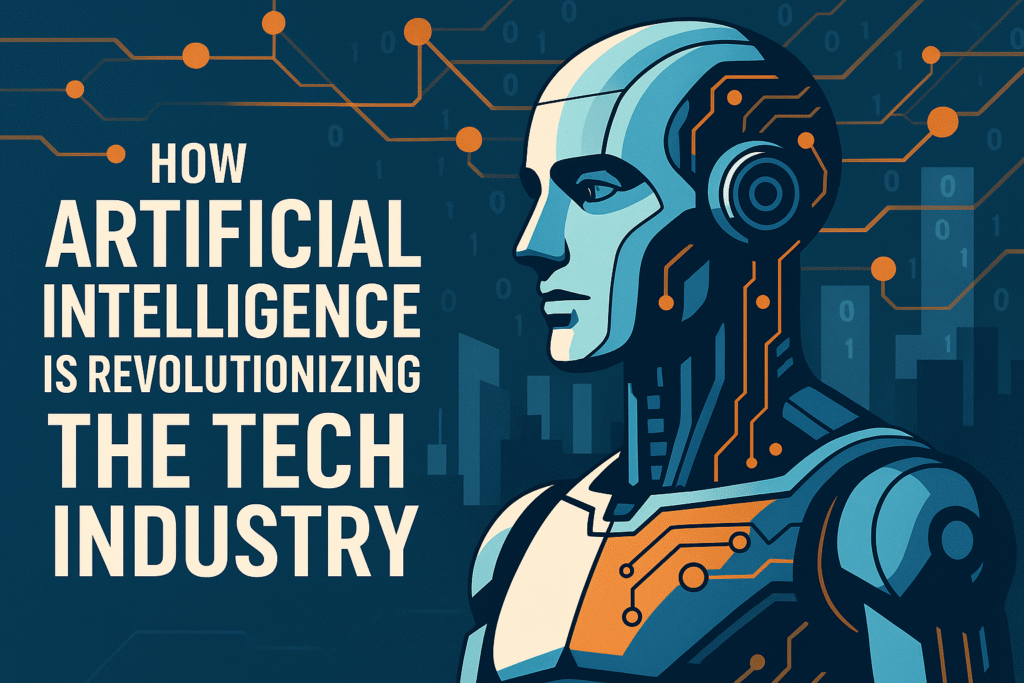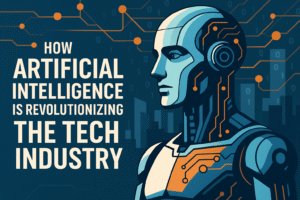Now Reading: How Artificial Intelligence Is Revolutionizing the Tech Industry: The Future Is Now
-
01
How Artificial Intelligence Is Revolutionizing the Tech Industry: The Future Is Now

How Artificial Intelligence Is Revolutionizing the Tech Industry: The Future Is Now
The integration of Artificial Intelligence (AI) into the technology industry isn’t just a trend — it’s a revolution. From reshaping business models to reinventing how we live, work, and create, AI is not only enhancing the tech sector — it’s redefining it entirely.
What was once a concept confined to science fiction has now become the beating heart of global innovation. From Silicon Valley to Singapore, tech companies large and small are rethinking their strategies, products, and services to keep up with the AI wave. But what exactly does this transformation look like — and how is AI changing the world’s most powerful industry?

Automation: The Foundation of the AI Takeover
One of AI’s earliest and most profound impacts has been in automating repetitive tasks. Whether it’s data entry, customer service via chatbots, or predictive text in your email app, AI is making operations faster, more efficient, and less prone to human error.
In tech companies, automation has extended to:
- Code generation and testing
- DevOps and system monitoring
- Cloud infrastructure management
This has not only boosted productivity but freed up developers and engineers to focus on more creative, strategic challenges.
Cybersecurity and Threat Detection
With great tech comes great vulnerability. Fortunately, AI is proving to be a game-changer in cybersecurity. AI systems can detect threats faster and more accurately than traditional systems. From identifying phishing attacks to monitoring network behavior in real time, AI has become the ultimate digital watchdog.
Tech firms are now relying on AI-driven cybersecurity to guard sensitive data and protect users from evolving threats — a critical advantage in a world of rising cybercrime.
AI-Powered Products That Change Lives
AI isn’t just improving how we build tech — it’s becoming the tech.
- Voice Assistants like Siri, Alexa, and Google Assistant use natural language processing (NLP) to engage with users in real time.
- Recommendation engines on Netflix and Spotify understand your preferences better than you do.
- Self-driving technology is turning cars into computers on wheels.
These innovations are reshaping consumer expectations and pushing tech companies to develop AI-first products that anticipate, adapt, and evolve alongside users.
Reinventing the Workforce and Skill Sets
AI is also transforming the tech workforce. As automation takes over repetitive tasks, the demand for AI specialists, machine learning engineers, data scientists, and ethical technologists is booming. Companies are investing heavily in AI upskilling and reskilling programs.
Educational platforms and institutions are launching AI-focused courses to ensure future-ready talent. Yet, this also brings challenges: concerns about job displacement, algorithmic bias, and the ethical use of AI continue to spark global debates.
Ethics, Transparency, and the Road Ahead
As AI’s influence grows, so does the responsibility to use it wisely. Issues like data privacy, algorithmic bias, job displacement, and deepfakes are real — and the tech industry must lead the charge in addressing them. The future lies in responsible AI: systems that are explainable, fair, transparent, and human-centered. Forward-thinking companies are now forming AI ethics boards, implementing bias audits, and aligning their models with global AI governance frameworks (like the EU AI Act).
Global Accessibility and Inclusion
AI is bridging global gaps, making technology more inclusive and accessible than ever:
- Real-time translation and transcription tools empower cross-cultural collaboration.
- AI-powered assistive tech helps individuals with disabilities navigate the digital world.
- Voice and text interfaces allow users in remote or underserved regions to connect, transact, and learn — with minimal infrastructure.
Tech is no longer reserved for the privileged few — AI is helping democratize it.
Startups and Innovation at Scale
AI is no longer limited to tech giants. Startups around the world are harnessing AI to build disruptive business models — from AI-driven healthcare platforms to predictive fintech tools. Open-source libraries, cloud-based ML platforms, and no-code/low-code solutions are lowering barriers to entry. Now, a solo founder or a small team can build intelligent applications without massive capital or infrastructure. This new wave of AI democratization is fueling a global explosion in innovation.
Smarter Decision-Making Through Data
AI thrives on data — and in return, it gives us insight. With the advent of machine learning and deep learning algorithms, tech companies now have the ability to
- Predict user behavior
- Personalize user experiences
- Detect anomalies in real time
- Optimize everything from marketing to logistics
Companies like Google, Amazon, and Meta are using AI-driven data analytics to make billions of decisions daily. These insights enable more accurate forecasts, faster decisions, and better outcomes — all with less human involvement.
Final Thoughts: The Future Is Being Written in Code
We are living in one of the most transformative periods in human history — a time when machines are no longer just tools but intelligent collaborators. Artificial Intelligence is not a passing trend or a futuristic fantasy; it is the new foundation upon which the global tech industry is being rebuilt. From intelligent automation and hyper-personalized experiences to real-time decision-making and predictive innovation, AI is reshaping every facet of the tech ecosystem. It has democratized innovation, lowered the barrier to entry for entrepreneurs, and empowered organizations to scale like never before.
But with this great power comes great responsibility. As AI integrates deeper into our infrastructure, it also raises vital questions around ethics, transparency, job displacement, algorithmic bias, and data privacy. The challenge is no longer about whether we can build smarter systems — it’s about building them responsibly, inclusively, and with foresight. Tech leaders must now wear multiple hats: engineer, ethicist, strategist, and steward. The companies and countries that thrive in this AI age will be those that invest not just in code, but in consciousness — building solutions that respect human values, enhance life, and create meaningful, measurable impact.
In the end, AI doesn’t just promise a smarter future — it demands a better one. The question is: Are we bold enough to lead it, wise enough to guide it, and ethical enough to share it? Because the future isn’t waiting — and it’s being written in algorithms right now.
























